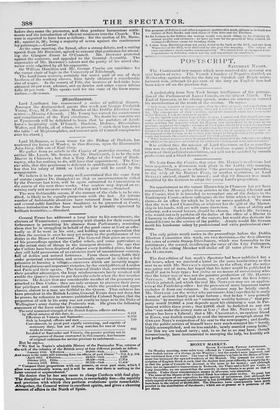General Evans has addressed a long letter to his constituents,
the electors of Westminster ; commencing with thanks for their continued forbearance in permitting his absence from Parliament ; reminding them that he is struggling in behalf of the good cause at least as effec.. tually as if he were in his seat ; and holding out an expectation that before the session is over he may yet return to the performance of his duties in the House of Commons. The General then gives an account of his proceedings against the Carlist rebels, and some particulars as to the actual state of things in the insurgent districts. He says that she Carlists have been deprived of almost every fortified place, but that they still hold possession of an extensive tract of mountainous country, lull of defiles and natural fortresses. From these strong- holds they snake perpetual excursions, and occasionally succeed in taking a few prisoners or burning a village,—successes which are instantly magni- fied into glorious and important victories, by the stockjobbers of London and Paris and their agents. The General thinks that, notwithstanding their peculiar advantages, the large reinforcements lately received will enable the Queen's forces to put down the rebels when the fine weather returns. He denies that any considerable number of the peasantry are attached to Don Carlos : they are only anxious to preserve their pecu- liar privileges and contraband trading; while the grandees and upper classes, almost to a man, are faithful to the Queen. That sickness has been prevalent in the British Legion, General Evans does not deny, but be proves, by reference to returns published by Colonel Napier, that the proportion of sick in his army was not nearly so large as in the Duke of Wellington's army during the Peninsula war. Ile gives the following statement of the force tinder his command—
The total numerical strength of the British Legion, officers and men, by official returns of this date, is 8,121 Effeetives at Vittoria and Santander 6,1:3fi
Sick in hospital, officers and men 749 Convalescent, in great part rapidly recovering, and capable of stationary duty, but not of long marches fur two or three weeks to come 806 Invalided at Santander and Vittoria, the greater portion not in
consequence of disease contracted in this country,•but because
of original unfitness for service previous to enlistment. 430 But he says- " We find in Napier's admirable History of the Peninsular War, returns of the sick of the infantry of the British army at four different periods as follow. January 1810. Effr'ctivcs 20,000—Sick 9,000 And many in the ranks still tottering from the effects of past illness.' "—Vol. 3. p. 224. 'April 1811. Effective' 23.613—Sick 9,298 October 1811. Ditto 29,530—Sick 17,974 January 1812. Ditto 30.222—Sick. 11,414' " Compare these proportions with our present, or even past state, which I allow was considerably worse, and it will be seen that there is nothing in the latter unusual or unprecedented." He denies that he has any cause to charge Cordova with foul play. The discipline of his troops, he asserts, is remarkably fine—the rapidity and precision with which they perform evolutions quite remarkable. Altogether, the General writes in excellent spirits, and gives a cheering
account of affairs in the North of Spain.


























 Previous page
Previous page